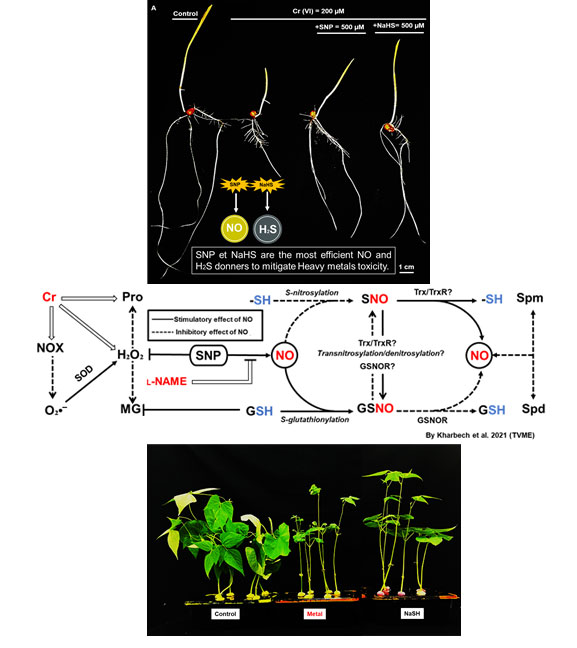
Correction of the Phytotoxicity of Heavy Metals with Eco-Friendly Inputs
Since 1993, our research team study the effects of heavy metals (HMs) on several aspects of the growth and development of some plants grown on hydroponic conditions. Physiological traits are studied on all developmental stages (germination, photosynthesis, ...) in collaboration with labs in Tunisia and worldwide. This led to the publication of scientific articles and the defense of a wide range of doctoral and master theses.
On another side, phytoremediation (classically known as the depollution of contaminated soils using hyperaccumulator plant species) can constitute, certes, a promising mean for the revaluation of these soils, but the scientific community and public authorities are beginning to accept the importance of the approach using certain non-harmful chemical inputs to "neutralize" or reduce, at least, the deleterious effects of HMs, example; chelators and ion competitors (EDTA, EGTA, Citrate, Oxalate, Malate, Mg, Ca, ...), melatonin, phytohormones and their derivatives, generators of signal molecules (NO and H2S), ... Our team focuses particular attention on the changes in cellular redox status indicators. We target biochemical and molecular levels of responses by enzymatic and transcriptomic tools.
Concerning the biological material used, seed germination being a crucial stage of the plant development cycle (first interface with the polluted environment), the impact of HMs on this process currently constitutes an important part of our research program.
Goals:
The general theme is: "The physiological, biochemical and molecular responses of plants to HMs stress"
The main objective is: ŌĆ£The mitigation of HMs effects by exogenous effectors that are not harmful to the environmentŌĆØ which constitutes the starting point of the ŌĆ£new generationŌĆØ phytoremediation model.
Thus, the team of this program plans to examine in contaminated plants the effects of corrective treatments potentially allowing:
(1) the detoxification of HMs and/or (2) the annihilation of their effects.
Socio-Economic Benefits:
In addition to improving knowledge (understanding the mechanisms by which inputs correct the depressive effects of HMs), the expected results can contribute to providing practical solutions for the revaluation of polluted soils.
|
Coordinator: Chaoui Abdelilah
|
Professor
|
|
El Ferjani Ezzedine
Chaoui Abdelilah
Djebali Wahbi
Karmous In├©s
Mazhoudi Salma
Sfaxi-Bousbih Amira
Kharbech Oussama
Bouazizi Houda
Sakouhi Lamia
|
Emeritus Professor
Professor
Professor
Assistant Professor
Assistant Professor
Assistant Professor
Assistant Professor
Assistant Professor
PES
|
|
Benmassoud Marouane
Tarhouni-Jaouani Khadija
Rahoui Sond├©s
Mahjoubi Yathreb
Aouini Marwa
BenKhalifa ImenAllah
Aloui Nawres
Chalghoumi Hajer
Larbi Soumaya
Loussaief Nesrrine
Khaireddine Leila
Yassine Nada
|
Post-Doc
Post-Doc
Post-Doc
Post-Doc
Ph.D. student
Ph.D. student
Ph.D. student
Ph.D. student
Ph.D. student
Ph.D. student
Master's intern
Master's intern
|
 facult├® des sciences de bizerte
Ensemble pour une facult├® meilleur
facult├® des sciences de bizerte
Ensemble pour une facult├® meilleur
 facult├® des sciences de bizerte
Ensemble pour une facult├® meilleur
facult├® des sciences de bizerte
Ensemble pour une facult├® meilleur